Mirleft, MOROCCO
Doing things the best you can may seem at first glance the way to go. It's probably what you've been taught. It may even be a "professional identity" claim. What if doing your best every time is not the best you can do for the "big game"?
Taking a closer look at fine tuning the level of perfectionism we apply to each task can be of great value towards our overall productivity optimization.
Intuitive criteria, quality and time
In some of my lectures, I ask participants to draw a bicycle within ten seconds. In such short time most drawings come out fairly basic, even childish. When questioned, many participants say confidently it's not a very good drawing. The intuitive criteria for this statement may range from how recognizable it is (or isn't), to the checking of should-have-components, like wheels or pedals. Some may say it's not bad for the time they had, but most feel they could do better with a little more time.
"What if I gave you twenty more seconds? Or ten more minutes? What about two more hours?"
The answers normally bring about a sort of pattern, a typical curve of quality in function of time dedicated to a task that looks like this:
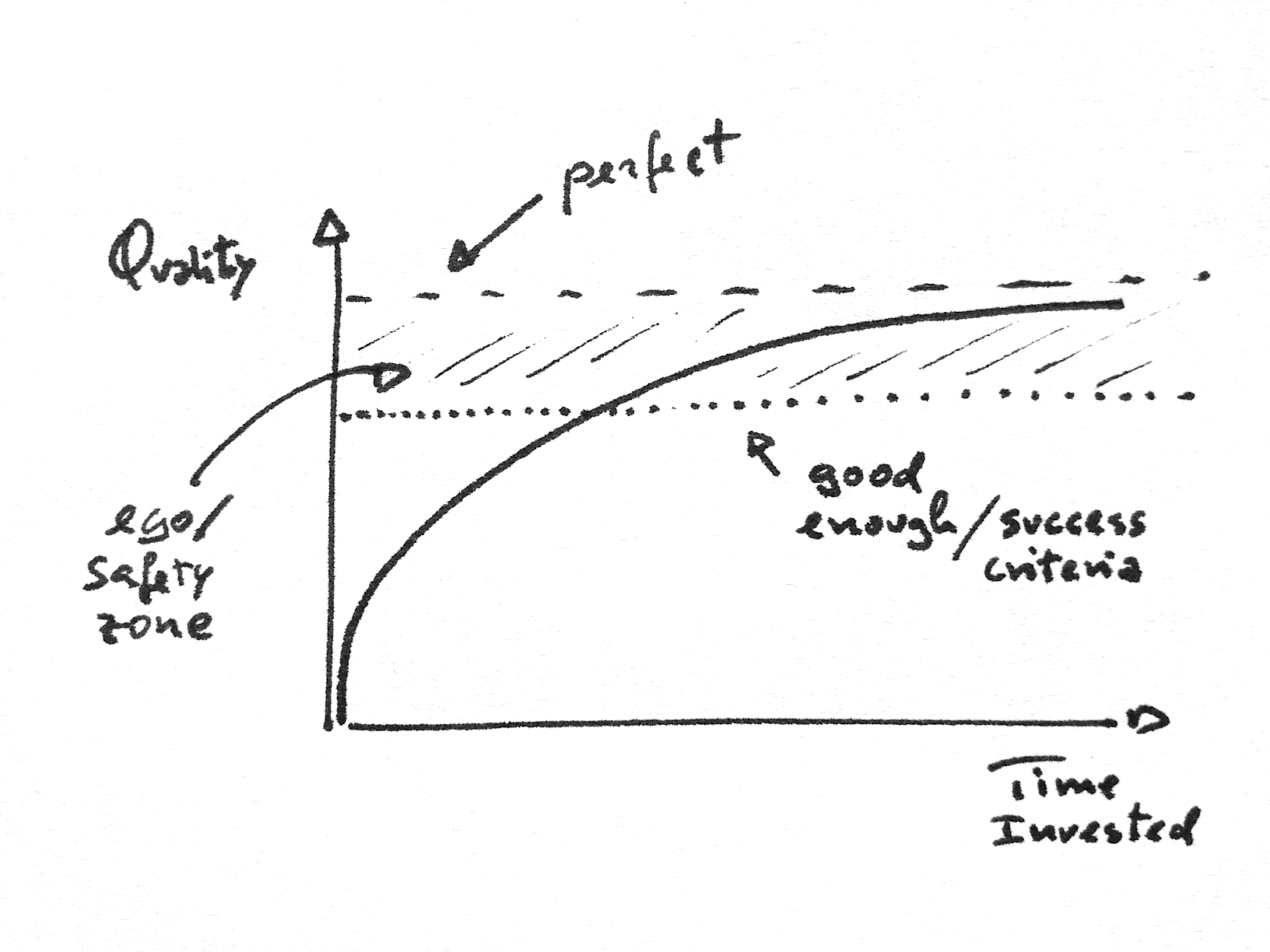
As time is invested in the task, the quality tends to get better, progressively reducing the improvement opportunities. The horizontal line at the top represents the "utopia", the perfection. As we move towards the right, the same amount of time invested brings less and less quality improvement, and in theory we never really hit "perfect". We may look for it ("perfectionism"), but never get there: there's always a micro detail that could be slightly better.
When is it "Good Enough"?
Considering this line runs to infinite, when do we stop? When do we know it is "good enough" ? When do we decide to deliver "as is" and move on to the next task? When do we say "enough for today" and go home? When do we say: "this is a good enough tv show" and stop zapping? or "this is a good enough camera" and stop looking for a better buy? or "this is a good enough shampoo choice" and add it to the supermarket basket? or "good enough parking spot" and stop looking? ...
? When do we decide to deliver "as is" and move on to the next task? When do we say "enough for today" and go home? When do we say: "this is a good enough tv show" and stop zapping? or "this is a good enough camera" and stop looking for a better buy? or "this is a good enough shampoo choice" and add it to the supermarket basket? or "good enough parking spot" and stop looking? ...
What criteria should we be using? Should we stop when we are sure we got the best possible choice? A reasonably good one? Should we stop only if we ran out of time for doing better? Or out of energy or patience? How do we choose "good enough"?
Purpose - at the core of Direction
If you set for the quest of finding a solid ground for defining success criteria for any given activity, it will be inevitable do ask: what are you trying to achieve? What is it for? What's the value within the task?
The most powerful word than encompasses this notions is probably PURPOSE.
What 's the purpose? There is tremendous value on this simple question. What do you want the stereo for? What are you trying to achieve with this e-mail? What do you want to see TV for? What do you want the parking spot for? What's your mission in your company? I know these are child-like questions. That's part of the idea. Children can ask really good questions sometimes. Those profound questions we so often consider such a given fact, we don't even ask them anymore. And often we go optimizing every detail in our life without realizing we may just be missing the global picture.
's the purpose? There is tremendous value on this simple question. What do you want the stereo for? What are you trying to achieve with this e-mail? What do you want to see TV for? What do you want the parking spot for? What's your mission in your company? I know these are child-like questions. That's part of the idea. Children can ask really good questions sometimes. Those profound questions we so often consider such a given fact, we don't even ask them anymore. And often we go optimizing every detail in our life without realizing we may just be missing the global picture.
PURPOSE is the much needed back to basics check that we are heading in the right direction.
Intuitive traps - once more...
Sometimes this Purpose will go against your quality intuition. Picture the example of the bicycle drawing: you thing you need more time to do a better job, right? You assume the success criteria of a good bicycle even if I don't tell you what the drawing is for. That's normal.
But now imagine that same drawing is to be used in a children cloth TV commercial spot. Two or three year old children will be drawing on a school board, and we need 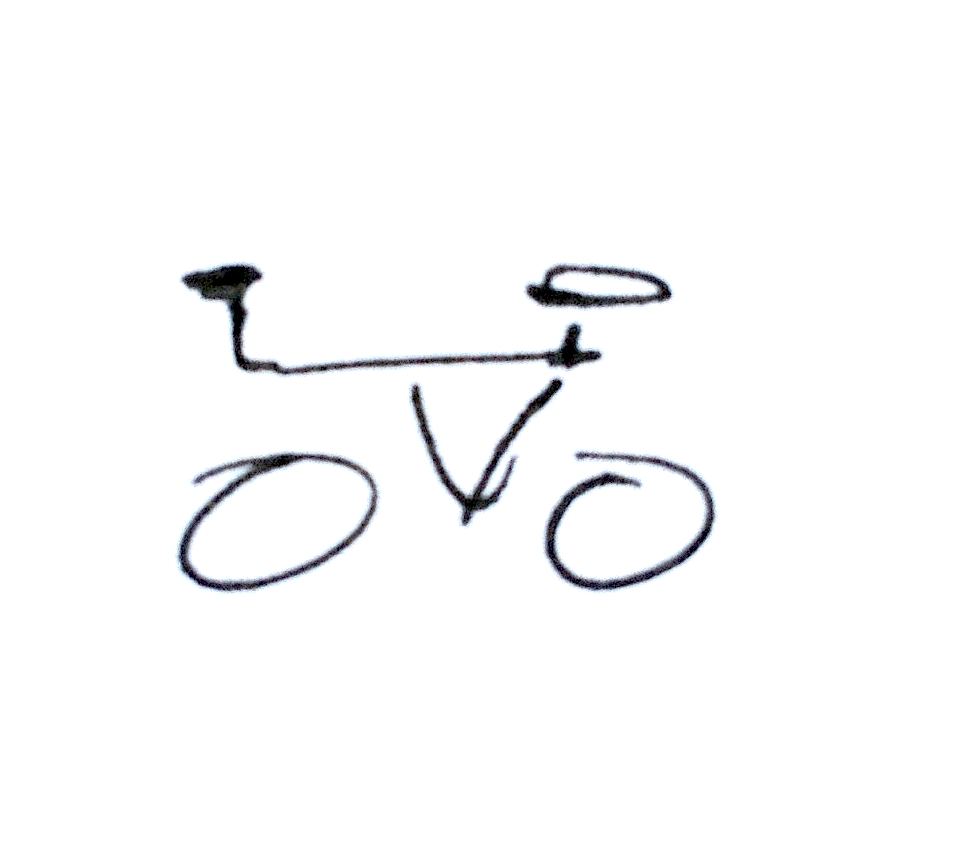 some two or three year old drawings already there, to make sure it comes out right and timely. All of a sudden, if you look at it, your ten second bicycle drawing may just have jumped to a level of excellence, at least for that specific purpose. What were intuitively the "best drawings" before, are now actually probably disqualified if they are "too fancy". A two or three year old kid wouldn't draw such a nice bicycle, so the drawing is no good for our purpose. And more: if I give you extra time to improve the drawing without specifying this purpose, you'll probably further disqualify it!
some two or three year old drawings already there, to make sure it comes out right and timely. All of a sudden, if you look at it, your ten second bicycle drawing may just have jumped to a level of excellence, at least for that specific purpose. What were intuitively the "best drawings" before, are now actually probably disqualified if they are "too fancy". A two or three year old kid wouldn't draw such a nice bicycle, so the drawing is no good for our purpose. And more: if I give you extra time to improve the drawing without specifying this purpose, you'll probably further disqualify it!
Of course not many of our tasks have such an opposition between intuitive success criteria and purpose. But the idea is: can you afford to invest more than enough time in a task, without truly knowing you are having the corresponding return in results, in added value? Do you really need those Excel columns to have exactly the same width of 5,14 so that your report accomplishes its reporting mission? Is that 5,07 column width that bad? How different will it fulfill its Purpose by that supposed quality improvement? Or are you just really feeding your ego need for perfection? In case you haven't thought of it, you may be associating perfection to the meaning of safety: a perfect task can't be "attacked". An important question could be: are you really in danger? And if you are, why is that? Don't you want to do something about it?
Cumulative Productivity - taking care of the global picture
What about the cumulative effect? Let's see another reason of importance to master "good enough" and not automatically "doing your best always".
Assume the following graphic again representing task quality along time invested, including tasks A, B and C, each with its own curve. If we let perfectionism rule, task A would take a looooong time, and B and C would have to be postponed. Gras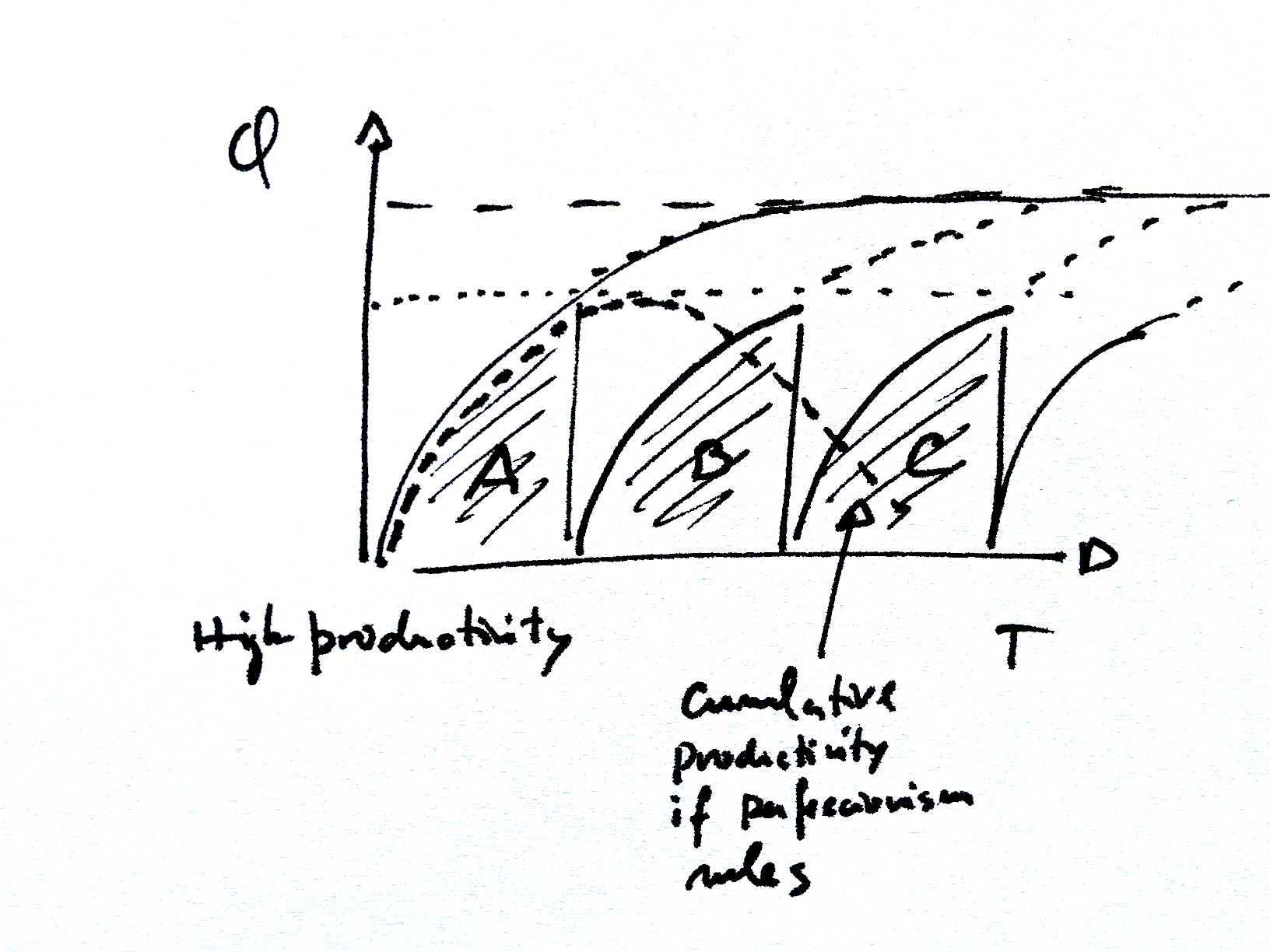 ping a concept of cumulative productivity, it gets easy to see that if you perfect each of the tasks above the level of "good enough", you are really failing to optimize the global productivity of your day, right? Above "good enough", you are accumulating opportunity cost of not doing other things that need your attention as well. This effect of big-picture-loss is a permanent threat in many areas of our life.
ping a concept of cumulative productivity, it gets easy to see that if you perfect each of the tasks above the level of "good enough", you are really failing to optimize the global productivity of your day, right? Above "good enough", you are accumulating opportunity cost of not doing other things that need your attention as well. This effect of big-picture-loss is a permanent threat in many areas of our life.
Let's see some specific examples. Imagine your money management. Imagine that you believe that if you can save enough money, you can enjoy a relaxed approach to life and a decent life quality. That may lead to the following intuitive beliefs: "I must be always very alert to all expenses" and "Whenever I can, I must avoid superfluous expenses." You probably already see the paradox: if you mathematically try to always be alert and worried about expenses, without a true balance for the whole picture, maybe you'll be missing the point: the "relax" approach you were trying to achieve in the beginning. Similarly if you are always avoiding superfluous expenses, maybe are not really accessing the life quality you wanted in the first place. The systematic search for a local maximum may just not optimize the global maximum.
Imagine your wedding day. What's the purpose of a wedding day? What's the success criteria for that? Let's assume you decided it should be a great and memorable day with your loved ones, full of beauty and glamour, and a mental state of good energy, sharing and love, and everyone has fun. If you ha ppen to spend too much energy on the days before the event, maybe even risking a too short night sleep before the big day, just to make sure last details are perfect, maybe you'll miss an important point there: how is your energy? Is it ok to assure you'll have great fun and take the most of your day? More over, if you, during the day, spend a big time talking to catering people and taking care of every detail and decision, to assure everything is perfect, aren't you risking missing the big point of enjoying yourself and spending time with your loved ones? Isn't it easy to miss the big picture, by following an intuitive intention of optimizing single details? What if the electricity fails during the party? Is it some catastrophe? Or can you turn it into a fun and glamourous moment of candle light in the wedding? Shouldn't you revisit the purpose lucidly so you can ensure good direction when you find yourself in the middle of the "chaotic action"?
ppen to spend too much energy on the days before the event, maybe even risking a too short night sleep before the big day, just to make sure last details are perfect, maybe you'll miss an important point there: how is your energy? Is it ok to assure you'll have great fun and take the most of your day? More over, if you, during the day, spend a big time talking to catering people and taking care of every detail and decision, to assure everything is perfect, aren't you risking missing the big point of enjoying yourself and spending time with your loved ones? Isn't it easy to miss the big picture, by following an intuitive intention of optimizing single details? What if the electricity fails during the party? Is it some catastrophe? Or can you turn it into a fun and glamourous moment of candle light in the wedding? Shouldn't you revisit the purpose lucidly so you can ensure good direction when you find yourself in the middle of the "chaotic action"?
Imagine parenthood, what's your mission? Could it be that too much concern about controlling every detail of the child may result in less freedom, development and discovery? What is your purpose? To protect? To guarantee a perfect world for the child? Is your intuitive effort of making everything as perfect as possible really resulting in the best for the child? Or are you after an intuitive feeling of peace of mind for having done everything you could? Where's the metric: the child's present and future welfare or your parent-feeling of peace for doing the best possible? Are they really the same? And couldn't it be that, in the middle of doing too much, you are giving your child an example of a too worried a person? You know he/she will copy a lot of however you live your life... if you could choose: you want him/her to have a relaxed way of living or a concerned and controlling one? What would you have for him/her? What's the big picture here? Where's the balanced approach? What's the Purpose? And where should intuitive micro-local-perfectionism give space for overall mission achievement?...
What other examples in your life can you think of? Where in your life might you be neglecting the "big picture" by trying intuitively so hard to be perfect in each small brick?
Final comment on quality
Please notice I still defend you should be rigorous and professional on what you do, and improve all the time. The trick is that you define and focus on the specific "success criteria" and not just follow "blindly" an intuitive one. An accountant can't say: let me just round all the cents on the parcels, cause I've heard I shouldn't be perfectionist... of course not! Cents are an intrinsic part of his job and mission, and must be included in the "good enough".
The recommendation is that each of us zooms out, and define exactly where the "good enough" is on each task graphic, so the big picture gets better!
To define that Direction you'll have to answer: "What's the purpose/value of what I'm doing?" and go after that!
On my next article, I'll be finishing this Chapter III - Goals & Direction. I'll be talking about how our professional drive, and even our life as a whole, can benefit from changing the meaning of "have to" into "want to", "obligations" into "opportunities"...
Until then, try a trick!
Gonçalo Gil Mata
www.WhatsTheTrick.com
NOW TRY A TRICK!...
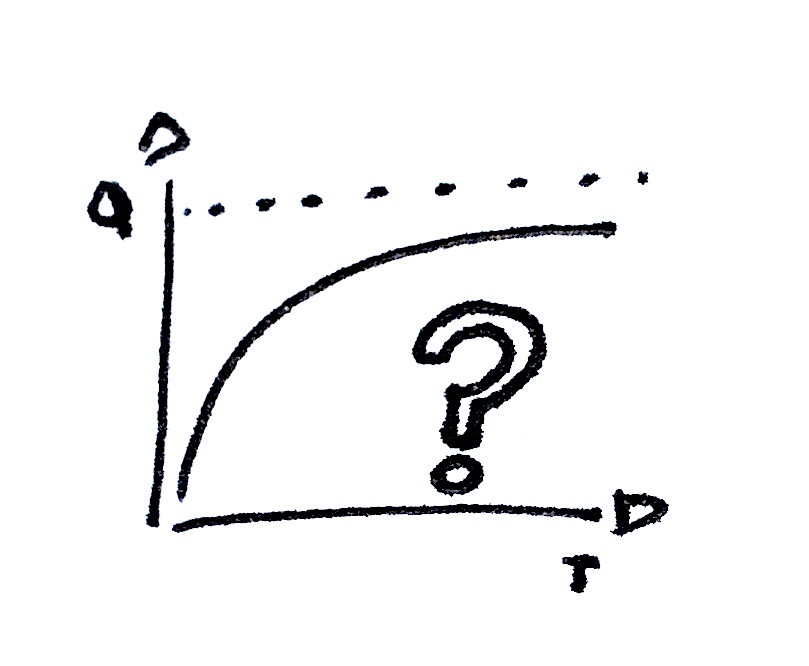
|T| Frequently review task purpose...>>
see more TRICKS - vote and comment on them!


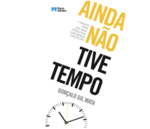
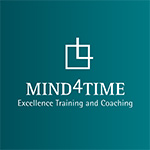

Диплом купить настоящий с гарантией купить диплом инженера